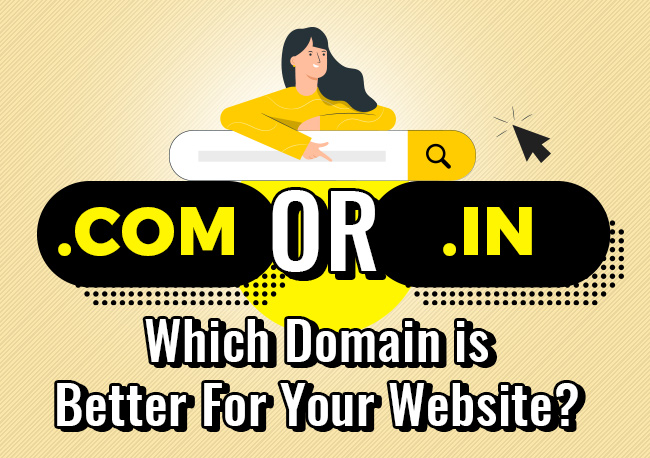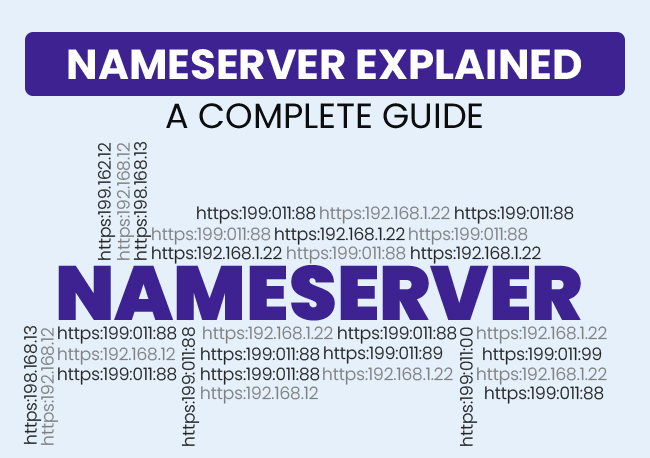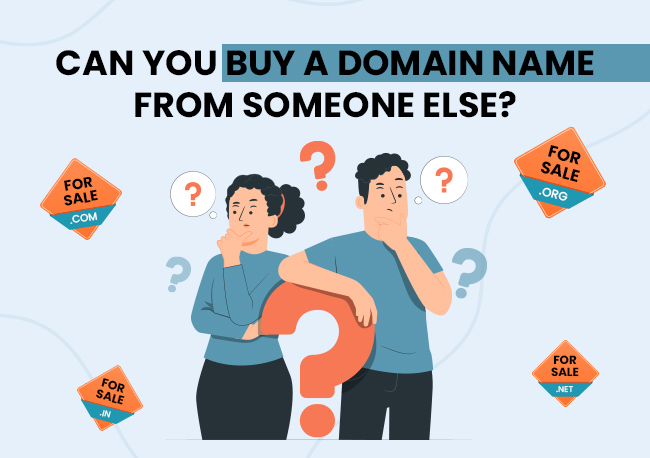Which Domain is Better, .COM or .IN?
The debate has been on for years now. These two extensions are known to be the oldest and most popular, which have certainly caused a stir among internet users around the globe.
There is no doubt that .com is the predominant suffix typed by the majority of internet users, but the .in has not been left far behind. Over the past decade, .in extension has gained immense popularity among Indian web owners and internet users. The year 2021 marked 3.5 million .in domain registers, which is expected to grow even more in the coming years.
It’s natural to feel perplexed about which extension to choose since both are at the upper hand. But not anymore! This post will dive deep into the pros of these two, the SEO implications on .com vs. .in domains, and how to choose the right one for your business.
Also Read: What are the Best Domain Extensions?
What is .COM Domain Extension?
.com is one of the internet’s earliest and most prevalent generic TLD (top-level domain).

Symbolics, Inc. first registered the .com TLD in 1985. In the initial years, it was managed by the United States Department of Defense and later by Verisign (A worldwide provider of domain name registry services).
Like the derived name, it was intended for commercial organizations. However, over the years, this TLD has been used for all types of websites. The .com domain extension has remained a primary choice among internet users and web owners despite the emergence and extinction of numerous other extensions.
You might have seen many famous websites registered under the .com extension —
Also Read: Understanding Domain Names – A Complete Guide
Why Choose .COM?
➢ No Restrictions
Regardless of the type of business, location, or size, .com is open for every web owner willing to register their sites under the extension. However, a few things need to be addressed when choosing a .com domain extension.
Ensure you regulate the rules set forth by ICANN (Internet Corporation For Assigned Names And Numbers). This includes the character limit, character usage, and issues to consider and settle for the domain name.
We all are well aware of the popularity and recognition of the .com domain extension. This states that a higher demand means fewer supplies. Meaning
you have to choose a unique name as there might be a website registered under the same name and domain as you might be thinking right now, leading you to consider other domain extensions.
Also Read: What To Do When Your Domain Name Is Taken?
➢ World Wide Access
Every web owner hopes to expand their business with no geographical boundaries. Although this is a long-term goal, it would be a great idea for you to prepare it in advance. This is why we recommend you buy .com as your domain name.
Unlike other ccTLDs, .com can be accessed by any user worldwide. For instance, if you buy a .us, .ca, or .au as your local domain, your business will get limited to these vicinities. However, upon buying .com, you can reach out to a wider audience and expand your business regardless of your business residence.
Also Read: Top 13 Techniques To Find Creative Domain Names For Your Business.
➢ A Default Extension
Previously we mentioned that .com is the common extension searched or autoselected by almost every internet user when accessing a website. It’s like they are habituated to using the .com domain as a standard practice when searching for a website. So, if you want web users to reach out to your website and become a well-recognized leader in your industry, go for .com.
However, .com is not only the choice of web users and owners. Many tend to look out for .org, .net, .co, .io, and numerous other gTLDs for their website. Also, selecting a domain extension depends on multiple aspects, such as type of business, target audience, and of course, availability.
Besides these factors, a domain extension should justify the purpose of your website. For instance, you have an NGO (Non-governmental Organization) site, and you decided to go for .co as your extension. But would that make any sense? No, it would not and confuse your target audience. For NGO sites, .org is the most preferred and used domain extension, and we recommend you use the same.
Now that we have discussed the .com domain extension. Let us move forward to explaining the .in domain extension.
What is .IN Domain Extension?
.in domain extension refers to a ccTLD (Country Code Top-level Domain) which was introduced in 1989.

.in stands for India because this domain suffix is meant for businesses and organizations who plan to build a website for the Indian audience.
.in can not only be used by businesses or organizations but also by academies & educational institutions, NGOs, government agencies, and many other businesses. Generally, .in helps in establishing an online business presence in the Indian market.
In fact, over the years, this suffix has become a preferred choice for web owners because it is a geo-target domain and can be accompanied by second-level domain extensions like .co.in, .org.in, .net.in, and so on to exhibit the actual focus of a website.
Also Read: What’s My Domain Name Worth? Ways To Estimate A Domain Value
Why Choose .IN?
➢ Brand Empowerment In India
Expanding and empowering your business in India becomes easy when you have .in as your domain. Firstly, it showcases that your business is based in India, which helps establish your brand image within the vicinity.
.in domain extension showcase that your business is committed to cater the Indian market and audience. In fact, it also shows that your business is well-acknowledged with the Indian territory, local culture, language, and preferences.
Unlike .com, buying the .in domain is relatively easy since it has higher availability for registration.
Also Read: SUBDOMAINS: What Is It & How Is It Helpful?
➢ Easy Recognition
Unlike numerous domain extensions, the .in suffix is relatively easy to type and recall. More importantly, it is associated with the native country where the targeted web users reside, which makes the extension more relatable and easy to remember.
Besides the association and simplicity, .in is a fantastic alternative to the .com suffix. It is unique, relevant, and easy to search, making your business appear in the best limelight possible.
➢ Dominant In Local Search
Even though domain extensions don’t directly affect SEO, .in extension can indirectly contribute to your online growth. Search engines tend to prioritize .in domain extension when displaying results to Indian audiences and markets. This could lead to improving your online visibility.
With a .in domain extension, you can signal to Google that your business is relevant to user search queries, and it is specifically intended for the Indian audience.
.in domain extension also reduces your competition. Since many web owners prefer .com, you get an edge in showcasing your website as unique and relevant as it is registered on the .in suffix.
In fact, the competition will be decreased significantly as the target keywords will be limited to the search intent of the Indian audience. Searching and using keywords for a .com extension is relatively difficult since you target a wider range of audience.
.in should be your priority if your business is popular among the Indian audience. Choosing this domain extension will improve your offline as well as online visibility. The more relevant keywords you have on your site, the more users can find meaningful answers to their search queries, which can boost your traffic and online visibility.
Also Read: Can Buying a Domain Name from Someone Else be Possible?
Factors To Consider When Choosing A Domain Extension
➢ Target Audience & Location
The foremost important aspect to consider when selecting a domain extension is the target audience and location. Your domain will reflect the relevancy of your business/brand. As previously mentioned, if you have an NGO site, choosing a .org domain extension will justify the relevancy among your target audience. Users can connect to the purpose and extension used in your site.
ccTLDs are also great for local SEO as search engines emphasize websites with .in suffixes and make them appear at the top in the search results of Indian audiences. Choosing .in will signal to Google that your business is limited to the Indian audience and market, making it easy for a potential audience to find your site.
Also Read: Nameserver: What Is It And What Does It Do?
➢ Niche
Most people focus on registering their site on .com because of its apparent recognition among web users. However, we always recommend you choose the extension aligning with your niche or industry. Doing so will show the relatability between your brand and website.
For instance, if you have an online shoe-selling website for the Indian audience, choosing www.shoes.co.in would make more sense. However, if you were to choose www.shoes.org, not only it looks uncoordinated with the brand’s purpose, but it also can confuse users. Choosing an unrelated domain extension also appears unprofessional, leading to site abandonment and customer churn.
Also Read: What Is A Website Name?
➢ Branding & Marketing
Branding and marketing, these two aspects boil down to one point — what is your goal? If your goal is to remain an Indian brand even in the foreseeable future, .in would be your best choice. However, if you plan to scale your business internationally, going for .com would be ideal.
For targeting multiple cities or countries, choosing different ccTLDs based on the target zone would be a perfect choice for your business. All in all, your marketing and branding goals should be taken into account when choosing a domain extension.
Also Read: Should I Buy Multiple Domain Names And Extensions?
➢ What If Your Plans Are Going Global?
The point has been made countless times and will be made again that if you plan to clamber up in the global market, go for .com. This suffix is accessible by every user on the internet despite the location. Plus, this domain is available for registration on every brand or business in any industry.
From eCommerce to educational institutions and healthcare & lifestyle, it has zero restrictions over any business type.
Lastly, .com is the most recalled extension by web users. The initial thought when a user searches for a website is to type .com in the URL. This might be out of habit or assuming that their searched website is for commercial purposes.
In fact, some users also let the auto search complete their query, thinking it’s the same website. So, if your site has a .com extension, your chance of reaching the top increases.
Another option for going global is making your website country-specific. You can buy different country domain extensions, such as .in, .ca, .uk, and .us, to make your site accessible for a specific country.
Let’s take Amazon, for example. This eCommerce site is registered for different countries, like https://www.amazon.ca and https://www.amazon.in, to reach out wider audience and become a global selling platform.
➢ Does SEO Favors .COM Extension?
The short answer is NO!
SEO does not favor the .com extension. Moreover, SEO is not biased toward any other gTLDs or New TLDs. In some manner, .com will certainly enhance the credibility of your website among your target audience. Since they recognize and trust the extension.
However, search engines only prioritize the best SEO practices you follow on your website. That includes content, website optimization, off-page SEO, technical SEO, backlinks, internal & external linking, etc.
So, Does Domain Extensions Affect SEO?
Well, Google confirms that TLDs do not impact SEO or offer ranking advantages. However, choosing the right extension can certainly help Google to recognize the actual purpose of your website and business. For instance, if you have a pizza restaurant, it would be great to go for a catchy and relevant extension such as .pizza. Of course, you can always choose .com if it is available.
Google even clears the air by stating that ccTLDs and New TLDs will also be weighed equally like other gTLDs such as .net, .org, and so on.
Even if you plan to switch one domain from another, Google will be crawling and indexing the domain in the same way it does with other ways. However, frequently switching domains is not advisable as improving ranking is time-consuming.
Also Read: Top Industries That Can Benefit From SEO
➢ Does .IN Domain Extension Impact Your Online Growth?
The .in domain informs Google that your website is solely targeted at Indian customers. This is the only impact created by the .in domain. However, this will indirectly improve the rankings of your website.
Let’s assume you have a restaurant chain in India. To promote online growth, you build a website and buy a domain called www.authenticindiankitchen.in.
Since you have .in as your domain extension, Google comprehends it and ultimately shows your site to the relevant audience searching for restaurants in India, leading to improved traffic and conversions. This is what a geo-targeted domain does for your online business.
Always remember that your website’s growth depends entirely on the quality & relevancy of your content, user experience, marketing efforts, and the best SEO practices you pursue.
Also Read: Website Optimization Tips To Increase Website Performance
.COM VS .IN: Choose Wisely
Regardless of your choice — .in or .com, we would always recommend you consider all the factors favoring your online presence. Even though domain extensions do not impact SEO, they certainly affect your target audience, which is a key factor for success.
Lastly, do verify the history of a purchased domain. Previously purchased domains might have a Black Hat SEO history to manipulate the rankings. This negative record includes spam links, keyword stuffing, plagiarized content, and, worst; it could have been backlisted from appearing in the search engines.
To safeguard against this future headache, don’t forget to check the history of your domain and take precautionary measures if needed.




